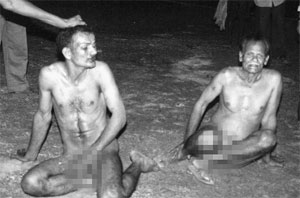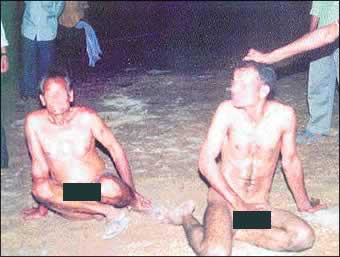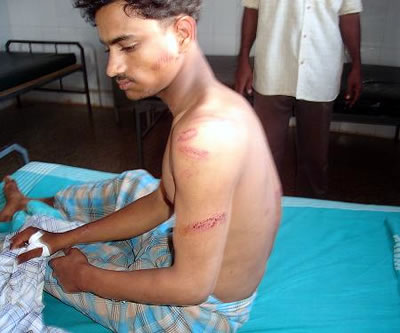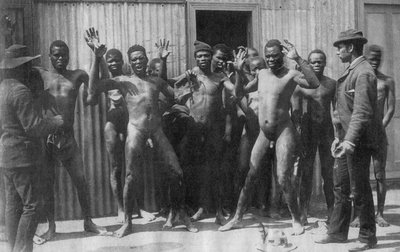19 January 2007
Women strip, parade officer naked
Father and son stripped naked in India
THEIR SHAME, OUR SHAME
Rightwing activists strip two people for buying cattle
By Chinmayee Manjunath
Udupi, Karnataka
May 07 , 2005
As more people gathered, the father and son were stripped in front of the villagers, who remained spectators. The tormentors then called a photographer to record the show
When 70-year-old Hajabba bought a calf on March 13, little did he know he would have to pay a big cost for it. That he would be beaten up and paraded naked. That his 29-year-old son, Hassanabba, would suffer the same fate. Or that his 68-year-old friend Kanthapujari and his son Satish would be jailed for a crime they had nothing to do with. The four, belonging to Moodubettu village in Udupi district, are the latest victims of the communal tension that is eating into this picturesque region of Karnataka.
 For What? Hajabba (left) and Hassanabba at the hands of the mob
For What? Hajabba (left) and Hassanabba at the hands of the mob
On the morning of March 13, Hajabba visited Kanthapujari at his home; the two regularly dealt in livestock. On his way back, he met another villager, Bhogushetty, who negotiated the sale of a calf. Paying him an advance of Rs 50, Hajabba agreed to take the calf in the evening. At 7pm, when Hajabba was on his way in his Maruti van to collect the calf, Bhogushetty stopped him near Kanthapujari’s home and handed over the cattle. Moments later, a crowd of around 10 people surrounded the vehicle and dragged Hajabba out. “They just started beating me,” recalls Hajabba, sitting on a bed at the hospital where he spent two weeks after the attack. The assaulters were members of the Hindu Yuva Sena (hys), a rightwing organisation with presence in the region. Meanwhile, Hassanabba, worried why his father had not returned, set out looking for him. “When I reached the spot, there were about 30 men and they began to thrash me as well,” he says, flanked by his father at the hospital.
As more people gathered, the father and son were stripped in front of the villagers, who remained spectators. The tormentors then called a photographer to record the show
They were then bundled into autos and driven to the helipad at Adi Udupi, about 2 km away. As more people gathered, the father and son were stripped and paraded in front of the villagers, who remained mute spectators. “Nobody came to help us. Everyone just stood and watched,” recounts a traumatised Hajabba.
The hys then called in a photographer. “They made us pose, saying nobody should ever buy calves after this,” says Hassanabba, who lost consciousness soon after. By then, police reached the helipad from Malpe, a neighbouring town. They retrieved Hajabba’s clothes and took him to the police station. Hassanabba, however, was missing. “I kept telling them to look for him but they ignored me,” says Hajabba. He was questioned till midnight. But there was still no sign of Hassanabba. “I don’t know where I was all night but when I got up at six in the morning, I was lying near the helipad, dressed,” says the father, recalling the events of that harrowing night.
The next morning, when Hajabba registered a complaint, Kanthapujari and Satish were taken to the police station. “They kept asking us where we were the last night and we told them we were at home,” says Kanthapujari. A heart patient, he was admitted to a government hospital in Udupi on March 16 under police surveillance and was discharged only last week.
“Unfortunately, we got the news about the attack late and by the time my men reached the spot of attack, the son was missing. We suspect that Kanthapujari was the middleman and Satish has close links with the Bajrang Dal,” says S. Murugan, the Udupi superintendent of police.
By late evening on March 14, the two were charged with being abettors of the crime and jailed. Suresh, Kanthapujari’s second son, says his father may have been implicated because he is known to do business with Hajabba. But Satish, he claims, has nothing to do with the hys. Bhogushetty’s name has not been mentioned in the complaints filed with the police. Satish, who was in hiding for some days, was arrested and released last week along with his father.
The prime accused, Yeshpal Suvarna and Prakash Bhandari, both leaders of the hys, have been missing since March 14. Several members of the hys have also gone underground and attempts to contact Vasudev Bhat, a prominent leader of the outfit in the region, were fruitless.
Murugan admits tension has been on the rise and it is not the first time trade of cattle has sparked off violence. Other incidents occurred in Mangalore, Karkala and Manipal, a region that has had a dominant presence of Muslims and Christians.
Weeks before the Adi Udupi incident, Vanitha, a factory worker in her early 20s, went missing under mysterious circumstances in Hejamadi village. She had asked her neighbour, Ismail, to help her find a better job. Activists of the hys attacked both for speaking to each other. When they filed a complaint, Vanitha was threatened by the hys, and was asked to withdraw her complaint. When she refused, Vanitha was assaulted. No one knows about her whereabouts. Till now no investigation has taken place while Ismail is in hiding and Vanitha’s brother, an eye-witness, is also missing.
Locals cite several such incidents. On March 19, a ceremony was held at a dargah in Udupi. It was attended by thousands. A local Kannada daily printed a photograph of two people carrying a green flag with the caption, “The Pakistani flag in Udupi.” Protests began soon, and though the paper was forced by the police to print an erratum the next day, the town remained tense. Days later, on March 26, bjp mla Raghupathy Bhat led a procession in Udupi. Witnesses say Bhat withdrew from the scene as members of the Sangh Parivar began to stone Muslim-owned shops en route. Bhat was not available for comments.
Locals live in constant fear and refuse to even speak about the hys or the Bajrang Dal. The region, where different communities have co-existed peacefully for decades, has become fraught with communal tension. “We always lived together. Why these people cause trouble, I never understand,” says Kanthapujari.




